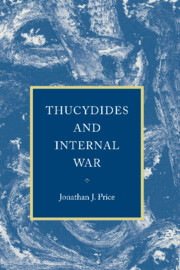7 - The Archaeology, the Pentekontaetia and the Persians
Published online by Cambridge University Press: 22 September 2009
Summary
THE ARCHAEOLOGY
The rise of Hellas
Thucydides' conception of Hellas is laid out in rudimentary form in the Archaeology. It may be said that the reader enters into the narrative of the war proper instructed in the idea of Hellas as a unified entity. This enables the reader to appreciate the fullest extent of the war's destruction: the primary casualty, that is, the casualty of prime historical importance, was Hellas itself.
Commentators rightly remark on the originality (by comparison with what survives) and intellectual power of the twenty terse chapters of the Archaeology. It provides precisely the proof required logically by the bold superlatives at the head of the work, i.e., a comparison of Thucydides' subject – the “greatest kinesis” in history – with all previous “great” and “noteworthy” events, mostly wars. This procedure, in accordance with fifth-century intellectual habit, led to speculation on the causes or requisites for greatness and worthy achievement. If Thucydides' sole aim in the Archaeology had been to compare previous wars with the Peloponnesian War, he would have begun with the Trojan War (1.8.4ff.), but there are (in the standard text divisions) seven chapters which schematically survey important causal developments before that point. The inquiry into cause, in turn, gives the Archaeology its form and structure.
- Type
- Chapter
- Information
- Thucydides and Internal War , pp. 333 - 377Publisher: Cambridge University PressPrint publication year: 2001



